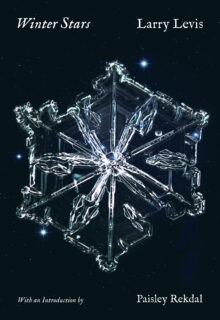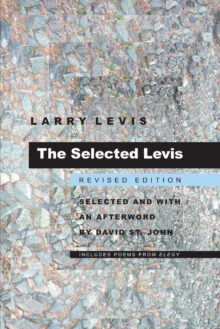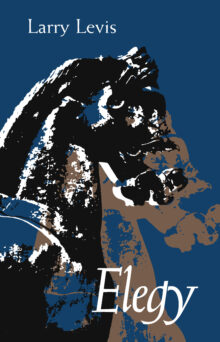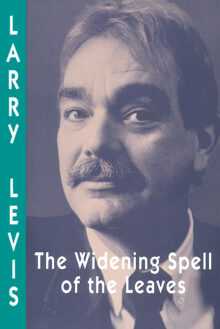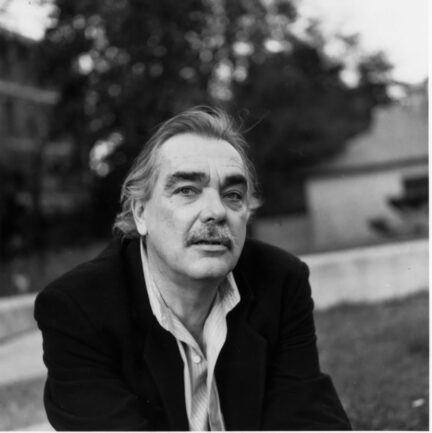
Larry Levis
Larry Levis was born in Fresno, California, in 1946. His first book of poems, Wrecking Crew, won the United States Award from the International Poetry Forum, and was published in the Pitt Poetry Series in 1972. His second book, The Afterlife, won the Lamont Award from the American Academy of Poets in 1976. In 1981, The Dollmaker’s Ghost was a winner of the Open Competition of the National Poetry Series. Among his other awards were three fellowships in poetry from the National Endowment for the Arts, a Fulbright Fellowship, and a Guggenheim Fellowship. Levis died in 1996.
Winter Stars
Revised Edition
Included in LitHub’s Most Anticipated Poetry of 2026
Since the appearance of his first book in 1972, Larry Levis has been one of the most original and most highly praised of contemporary American poets. In Winter Stars, a book of love poems and elegies, Levis engages in a process of relentless self-interrogation about his life, about losses and acceptances. What emerges is not merely autobiography, but a biography of the reader, a representative life of our time.
The Selected Levis
Revised Edition
Edited and with an Afterword by David St. John
When Larry Levis died suddenly in 1996, Philip Levine wrote that he had years earlier recognized Levis as “the most gifted and determined young poet I have ever had the good fortune to have in one of my classes. . . . His early death is a staggering loss for our poetry, but what he left is a major achievement that will enrich our lives.” Each of his books was published to wide critical acclaim, and David St. John has collected together the best of his work from his first five books: Wrecking Crew (1972), Afterlife (1976), The Dollmaker’s Ghost (1981), Winter Stars (1985) and The Widening Spell of the Leaves (1991).
“It is not an exaggeration to say that the death of Larry Levis in 1996—; of a heart attack at 49—; sent a shock wave through the ranks of American poetry. Not only was Levis a good friend to many poets (not simply of his own generation but of many poets older and younger as well), his poetry had become a kind of touchstone for many of us, a source of special inspiration and awe. With Larry Levis’ death came the sense that an American original had been lost. . . . It is not at all paradoxical that he saw both the most intimate expressions of poetry and the grandest gestures of art, of language, as constituting individual acts of courage. One can only hope that, like such courage, Larry Levis’s remarkable poems will continue to live far into our literature.”—David St. John, from the afterword
Elegy
A few days before his death in 1996, Larry Levis mentioned to his friend and former instructor Philip Levine that he had “an all-but-completed manuscript” of poems. Levine had years earlier recognized Levis as “the most gifted and determined young poet I have ever had the good fortune to have in one of my classes”; after Levis's death, Levine edited the poems Levis had left behind. What emerged is this haunting collection, Elegy.
The poems were written in the six years following publication of his previous book, The Widening Spell of the Leaves, and continue and extend the jazz improvisations on themes that gave those poems their resonance. There are poems of sudden stops and threats from the wild: an opossum halts traffic and snaps at pedestrians in posh west Los Angeles; a migrant worker falls victim to the bites of two beautiful black widow spiders; horses starve during a Russian famine; a thief, sitting in the rigging of Columbus’s ship, contemplates his work in the New World. The collection culminates in the elegies written to a world in which culture fragments; in which the beasts of burden—the horses, the migrant workers—are worked toward death; a world in which “Love's an immigrant, it shows itself in its work. / It works for almost nothing”; a world in which “you were no longer permitted to know, / Or to decide for yourself, / Whether there was an angel inside you, or whether there wasn't.”
Elegy, as Levine says, was “written by one of our essential poets at the very height of his powers. His early death is a staggering loss for our poetry, but what he left is a major achievement that will enrich our lives.”
The Widening Spell of the Leaves
The result is a book of discursive meditations that will amply reward the reader. Part travelogue, part pilgrimage in which the shrines remain hidden until they are recognized later, Larry Levis’s startling and complex fifth book of poems is about the enslavement to desire for personal freedom, and the awareness of its price.

